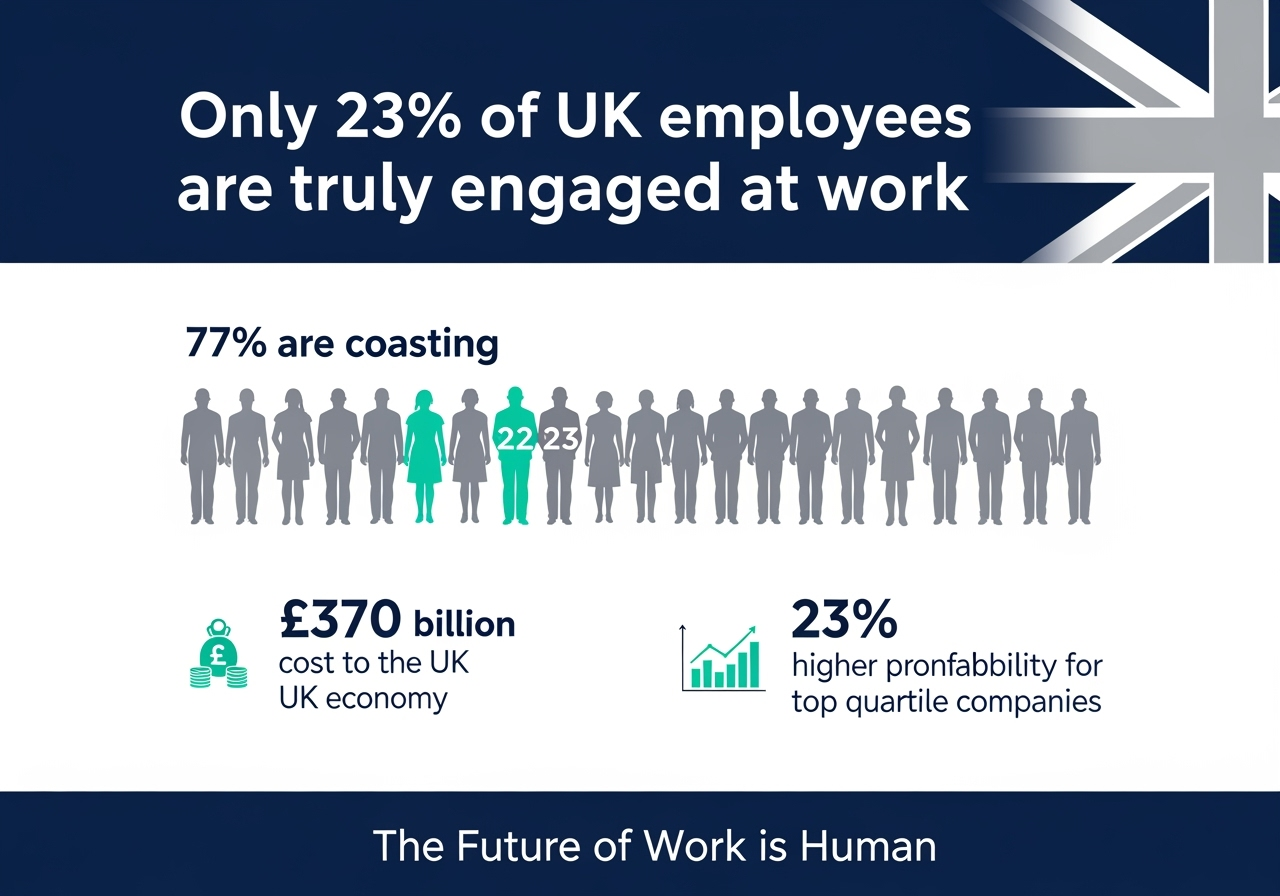Building Future-Ready Teams

Building Future-Ready Teams: The Human Factor in Business Success
In boardrooms across the UK, conversations about the future of work often centre on artificial intelligence, automation, and digital transformation. Yet the most successful organisations are discovering a profound truth: the future isn't just digital—it's fundamentally human.
As we navigate an increasingly complex business landscape, the companies that thrive aren't necessarily those with the most sophisticated technology, but those that truly engage their people. They understand that wholehearted involvement from every team member isn't just nice to have—it's the competitive advantage that determines long-term success.
The Science of Human Engagement
Research from Gallup's State of the Global Workplace reveals a striking reality: only 23% of employees worldwide are actively engaged at work. In the UK, whilst we perform slightly better than the global average, we're still leaving enormous potential untapped. Disengaged employees cost the UK economy between £340 billion and £370 billion annually in lost productivity.
But here's where it gets interesting. Organisations in the top quartile for employee engagement show 23% higher profitability, 18% higher productivity, and 12% better customer metrics. Professor Amy Edmondson's groundbreaking work on psychological safety at Harvard Business School demonstrates that teams with high psychological safety are 76% more likely to engage in innovative problem-solving.
The message is clear: when we truly engage people—inviting wholehearted involvement for planned, courageous actions—we unlock exponential returns.
Beyond the Buzzwords: What Real Engagement Looks Like
Simon Sinek reminds us that "leadership is not about being in charge. It's about taking care of those in your charge." This philosophy sits at the heart of building future-ready teams. Real engagement isn't about ping-pong tables or casual Fridays—it's about creating environments where people feel genuinely valued, heard, and empowered to contribute their best work.
Consider this: when employees feel their voice matters, they're 4.6 times more likely to feel empowered to perform their best work, according to Salesforce research. Yet how many organisations truly listen? How many leaders create space for the kind of wholehearted involvement that transforms both individuals and businesses?
"The best way to find out if you can trust somebody is to trust them." This wisdom applies perfectly to team building. When we demonstrate trust in our people's capabilities and judgement, we create the conditions for extraordinary performance.
The Neuroscience of Team Performance
Neuroscientist Dr. David Rock's SCARF model reveals why some teams flourish whilst others flounder. When team members experience threats to their Status, Certainty, Autonomy, Relatedness, or Fairness, their brains literally shift into defensive mode, reducing cognitive capacity and creative thinking by up to 50%.
Conversely, when these needs are met, teams enter what researchers call "flow state"—a condition where performance, innovation, and satisfaction soar simultaneously. Google's Project Aristotle, which analysed hundreds of teams, found that psychological safety was the single most important factor in high-performing teams, more crucial than individual talent or resources.
"Success isn't just about what you accomplish in your life, it's about what you inspire others to do." This principle becomes the foundation for creating psychologically safe environments where people feel secure enough to take risks, share ideas, and challenge the status quo.
Practical Strategies for Human-Centred Leadership
Building future-ready teams requires intentional action. Start with what Daniel Pink calls the three pillars of intrinsic motivation: autonomy, mastery, and purpose. When people understand not just what they're doing, but why it matters, engagement naturally follows.
Regular one-to-ones aren't just administrative exercises—they're opportunities to truly enquire about each person's aspirations, challenges, and ideas. Ask diagnostic questions that seek insights for immediate and sustainable advantage. What's working well? What obstacles are slowing progress? How can we better support your growth?
Marcus Buckingham's research shows that employees who use their strengths every day are six times more likely to be engaged at work. This isn't about generic team-building exercises—it's about understanding each person's unique contribution and creating roles that allow them to flourish.
"The greatest gift you can give someone is your time and attention." In our hyper-connected world, the simple act of being fully present with team members becomes a powerful engagement tool.
The Compound Effect of Human Investment
When we invest in the human factor, the returns compound over time. Engaged employees are natural ambassadors for your organisation, attracting top talent and delighting customers. They're more resilient during challenging periods and more innovative during growth phases.
Research from MIT's Sloan School of Management shows that companies with highly engaged workforces see 2.3 times higher revenue growth compared to their competitors. But perhaps more importantly, they create environments where people genuinely want to contribute their best work—not because they have to, but because they choose to.
Your Next Steps
Building future-ready teams isn't about implementing the latest management fad. It's about returning to fundamental human truths: people thrive when they feel valued, trusted, and connected to something meaningful.
Start small but start today. Have one meaningful conversation with a team member. Ask one diagnostic question that shows you genuinely care about their perspective. Create one opportunity for someone to use their strengths in a new way.
The future of work may be uncertain, but one thing remains constant: organisations that truly engage their people—inviting wholehearted involvement for planned, courageous actions—will always have the competitive advantage that matters most.
"The best leaders are those who serve others." When we serve our people well, they'll serve our customers, our communities, and our shared future with the kind of wholehearted involvement that transforms businesses and lives alike.
For more information please send a message via the Contact Us Page. Or you can register for an upcoming webinar.


